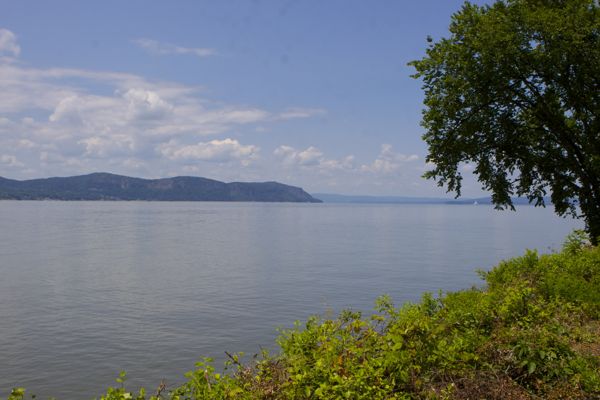“innumerable streams for delight” and “the most noble rivers of the world”
(Hudson River – view from Tarrytown NY, looking north toward Haverstraw Bay)
My working class family was not of an intellectual or patriotic bent – when it came to July 4, we celebrated my Grandfather “Pop’s” birthday with a cookout, horseshoes, and beer.
I too reject the patriotic flag waving, but do like to dabble in history, so on this 4th, of the best known founding documents, i.e. The Declaration of Independence, The Constitution, and The Federalist Papers, we are reading and provide an except of the latter.
Conventional “Independence Day” wisdom celebrates the political ideals of democracy, freedom and independence, but at the outset, Federalist Paper #2 boasts how these foundations are intimately and organically related to – almost dependent upon or a product of – the natural world.
But today, almost ignored is the essential role of the natural world in the founding of the Republic.
Few seem to know that the Federalist Papers project was conceived by Alexander Hamilton while sailing in a sloop down the Hudson River from Albany to New York City, where he wrote Federalist #1 and decided to recruit John Jay and James Madison in the project, writing under the collective pseudonym “Publius”.
These natural roots of the Republic deserve special attention right now, as our economic and political systems neglect and attack the natural world as just another commodity to exploit and exhaust until collapse, as Karl Polanyi warned in “The Great Transformation”.
Grounding his first substantive argument for what Hamilton called “the advantages of Union” in his introductory Federalist #1, John Jay (as Publius) wrote in Federalist #2:
It has often given me pleasure to observe, that Independent America was not composed of detached and distant territories, but that one connected, fertile, wide spreading country was the portion of our western sons of liberty. Providence has in a particular manner blessed it with a variety of soils and productions, and watered it with innumerable streams, for the delight and accommodation of its inhabitants. A succession of navigable waters forms a kind of chain round its borders, as if to bind it together; while the most noble rivers in the world, running at convenient distances, present them with highways for the easy communication of friendly aids, and the mutual transportation and exchange of their various commodities.
Take delight in what’s left – but lament that largely lost legacy as you celebrate today.

